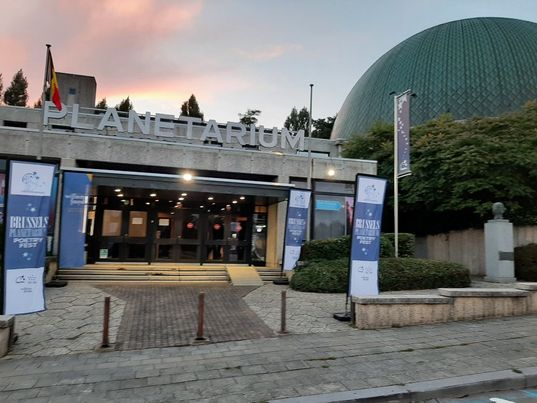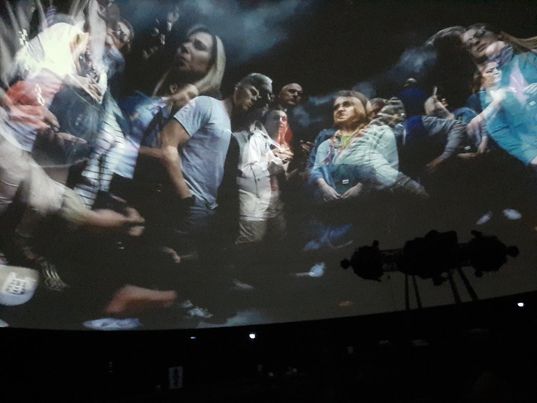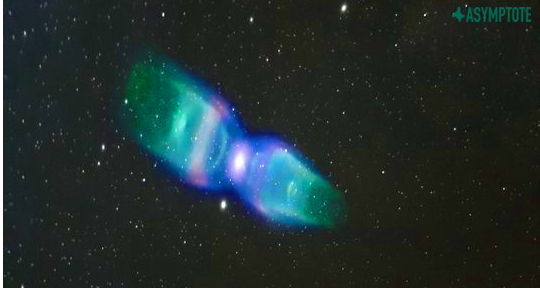Since 2014, the Brussels Planetarium has been host to a poetry festival that wrangles in the celestial forces to commune with language. The resulting event is a brilliant amalgam of performance, verse, and media, with the latest in immersion technology being applied to transport the audience into the land- and soundscape of the poet’s imagination. This year, our Editor-at-Large MARGENTO reports from the festival, giving us a close-up of the works that lent the city their magic, and the global consciousness a sense of poetry’s endless potentials in the technology age.
Whether in hangover or relapse, (post?)pandemic times seem to be bringing about a bruised euphoria of collectivity and in-person proximity. If not packed concert halls, then outdoor gigs; if not crowded pubs, then nicely scattered and still-animated patios. In the meantime, artists and writers seem even more eager to embrace collaboration or collective action in reinvigorated ways that are nevertheless pungently critical of (post)pandemic prospects of communal life and culture. This year’s edition of Brussels Planetarium Poetry Fest intriguingly captured all of these trends while putting poetry, the arts, science, and, most urgently, the (post)human condition in perspective.
And I mean literally so. The unique venue of the Planetarium and its 3-D affordances can offer a unique experience and a “cosmic” medium poetry has perhaps always striven for, but has rarely had the opportunity to enjoy so palpably. And it is no coincidence that the festival itself has been organized there for eight annual editions (including in the midst of the pandemic in 2020). Indeed, it is not only that the name of the curator himself, Philip Meersman—poet and coordinator of the World Poetry Organization—aurally resonates with “immersion”; the concept has in fact been a long-standing preoccupation with the Belgian slammer, materializing in events such as Brussels Planetarium Poetry Fest or the Inclusive World Poetry Slam Championship (and also a PhD project he is working on at KASK Antwerp on visual poetry as… immersive experience). In his prefatory note in the festival’s programme, Meersman places the theme of the festival—the possible “dialogue between science, religion, immaterial heritage. […] (de)colonization, and white masculinity”—naturally in a celestial context, as “stars guide our most intimate ceremonies” towards a question that he deems prophetic: “How will you remember me?”

On both nights of the festival, therefore, the audience found themselves from the very beginning plunged into an enveloping dark and then instantly hurled into a 3D, 360-degree dome projection that “physically” took them on an overwhelming multidirectional voyage across the universe and among celestial bodies and meteorites. What was even more impressive was that these projections were not simply Planetarium material played as (random) backdrop to poetry acts, but a shrewdly planned and accomplished fusion of the two that involved visuals—contributed by the poets themselves—embedded into, dialoguing with, or even deconstructing the all-engulfing astronomical vistas. As the website puts it, the Planetarium’s technicians have in fact “translated” the poets’ “texts and recordings” into the projection, drawing on existing material but also “specially acquired images, 3D-projection models, photos, and results of scientific research” (my emphasis).
The above-mentioned cross-disciplinary scope was complemented by the cross-artform approach of most performances and the multilingual atmosphere—established by Meersman’s trilingual introductions and remarks (Dutch, French, and English), as well as the pieces themselves, presented in (a number of variants of) French, English, Flemish Dutch, and Polish. All this richness and diversity was balanced out by another rare and distinctive feature of the festival; unlike your regular literature fest where readings and performances are crammed by the dozens into cluttered programmes and inevitably rushed away by flushed and panting curators, the Planetarium Poetry Fest has traditionally featured just a handful of writers/artists every year, adopting a spaced-out, slow-paced, and composed approach fitting for its multi-galactic setting.
An obvious advantage of the mindful curation is that the participating poets then give complex, rich, full-fledged presentations, of which the audience are able to absorb, enjoy, and remember the way they concur into the overall event and its theme(s). Add to this the fact that traditionally, (most if not all) the featured poets and artists are invited to perform on both nights of the festival, furthering the special bond that more often than not materalises between writer and audience. In fact, bonds, shared concerns and loci, homecoming and/as nomadism, etc., are inevitably leitmotifs of such events. For instance, Eduard Escoffet and Gianluca Abbate—a Spanish poet and an Italian filmmaker—presented a film-poem inspired by a real-life place; the personal relevance of Matera (in southern Italy) informed the poet’s occasioned repetitive lines of verse, which reflected obsessively on belonging, place, the stages of life, and various historical ages, while the images kept revisiting ancient Greek and Roman vestiges in the area and parading endless files of identical characters. Projected against the Planetarium’s ongoing night-sky dome footage, the presentation notably amounted to what Meersman has termed in his introductory remarks as star-guided intimate ceremonies.
Compellingly intimate indeed was the sound of Polish poet Weronika Maja Lewandowska’s performance—I say “the sound” as she recited/chanted in her language, and there was no translation available, so likely for most in the audience, the recital’s musicality was the main accessible dimension of her poems. And yet the impact was thick in the air. With tones ranging from sensual to childish-prankish and rhythms emerging from syntactic, accentual, and euphonious patterns, proceeding on the percussion of breath or even tongue-clicking, Lewandowska mesmerized and left the audience wanting more. A fascinating voice and presence, she was one of the acts that most likely attracted abundant further interest beyond the event— expectedly so since, as stated in her bio in the programme, she also works at the confluence of performance poetry and virtual reality (VR). This multimedia approach was also practiced by other remarkable women poets featured at the fest, such as writer, musician, and VR artist Maud Vanhauwert and Margot Delaet—poet, philosopher, and translation studies scholar. The coalescence of the wide-ranging interests and competences of these poets became apparent in readings that “simply” involved texts on a laptop and their ‘translation’ into interstellar journeys, as well as Dadaistically progressing anagrams projected on the dome while the sounds and wordings of poems such as Vanhauwert’s lived true to the “fresh, urban, and Babylonian” qualifiers in the program description.

One of the most touching moments of the festival was Meersman’s faltering-voiced, heartrending evocation of Sepedi-writing South African poet Matete Motsoaledi. Motsoaledi had been advertised as the 2020 edition teaser for this year’s edition, but had died from a heart attack in Mpumalanga where—as Meersman emotionally iterated—ambulances can take hours to arrive when called, with one arriving too late in Mottsoaledi’s case as well… The South African poet’s performance was replaced by a tribute presenting his collaborations with Meersman himself as well as with Sam Van Ryssel, which was also suitably complemented by the mellifluous musical performance/recital interventions from another African poet-composer-slammer, Sêminvo Xlixè.
Coming back from the festival to Europe’s capital’s city lights and barely revived nightlife felt like returning from a parallel universe to a mundane (post)pandemic reality, which seemed nevertheless easier to grasp from a cosmic-poetic and, at the same time, intensely human-inquisitive standpoint. Brussels Planetarium Poetry Fest is a unique event in Europe—and likely beyond as well—offering an unmatchable experience and covering an outstanding range of languages, subjects, media, and literary art forms.
MARGENTO (Chris Tănăsescu) is a poet, academic, and performer. He is currently working—together with John Taylor—on a computationally assembled Belgian poetry anthology. MARGENTO is Asymptote‘s Romania & Moldova Editor-at-Large.
*****
Read more on the Asymptote blog:

